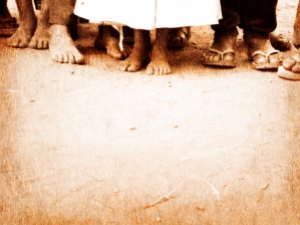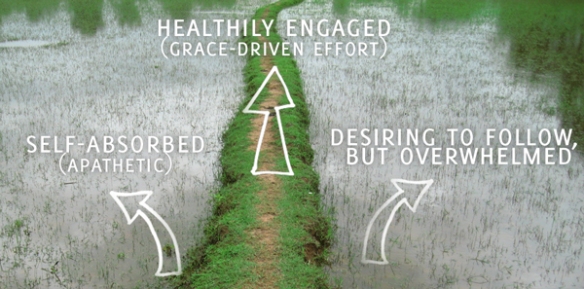There are no quick fixes. While it is tempting to find a drive-thru, feel good solution and “just do it,” we know life is far more complex for using simple methods to get a new you by Friday.
“Christian life does not arise spontaneously in us. The truth of the gospel cannot always be reached through a process of reasoning. We need to meditate long on the words of Jesus. It is only through familiarity and association with the Gospels that we begin slowly to learn to live like him.”
How do we not give up?
 By staring at the one who never gave up, who was joyfully obedient to God His Father until the very end. And then follow in His steps.
By staring at the one who never gave up, who was joyfully obedient to God His Father until the very end. And then follow in His steps.
If I invite Jesus into my life — which is a mess — I will become discouraged when He doesn’t change me as quickly as I want, or provide the comfortable life I envisioned. (Many “try” Jesus and conclude He doesn’t work. Because Jesus spoke mostly about the Kingdom of God and invited us to flee from the kingdom of self, He offers a better way than this.)
But if I respond to Jesus, who invites me into His life, I will place Someone at the center who can effectively navigate the twists and turns of life.
Know this: out of His great strength, He can make you and me whole. Will you surrender?
I can think of no greater ambition this year than studying the life of Jesus and being changed into His image. Of course not everyone will be changed as they read, for not all have faith. To really know God, we must really know Jesus.
An invitation: Pick up one of the Gospels this month, reading it through five times. With each thoughtful time through your mind will be awakened to the sheer awesomeness of this man. He will surprise, invite, confront, challenge, and inspire you. (And so much more. Like Aslan, Jesus is very good, but He is far from safe.)
- Mark is the shortest, looking at the pattern and purpose of His life, for those on the go. You can read it through in one sitting. (The clear outline: Who is Jesus » why did He come » What does it mean to follow Him?)
- Matthew gives us a healthy does of Jesus’ words, confronting our half-baked ideas about God, self and others. He fulfills the longings of the people around Him, but never in the way they assumed He would.
- Luke examines the evidence for Jesus and brings us accounts from numerous eye witnesses.
- John helps the right-brained (visual, artistic) learner envision Jesus as God come in the flesh. God in a Bod is better than we imagined.
 Of course, those are not exactly the groups to which the Gospel writers made their arguments, but a simple way to approach which one to start with, based on how you’re wired.
Of course, those are not exactly the groups to which the Gospel writers made their arguments, but a simple way to approach which one to start with, based on how you’re wired.
Each writer was making an argument about Jesus, not just collecting the facts about Him.
- To the Romans » Mark portrays Jesus the Servant
- To the Jews » Matthew sets forth Jesus the King, promised for centuries to the rescue His people and the world
- To the Gentiles » Luke (the only Gentile writer of a NT book) portrays Jesus the Man
- To the Greeks » John shows what ultimately reality looks like as Jesus is the Son of God
If you’re curious why there are four Gospel accounts, Ray Stedman gives us a helpful reminder why:
“There is a reason for this, designed deliberately by the Holy Spirit. We make a mistake if we think these four Gospels are four biographies of the Lord. They are not biographies at all, they are character sketches, intended to be different, intended to present different points of view. Therefore, they constitute four distinct views of our Lord and of his work.
The Gospel of Matthew is written to present Christ as the King. The Gospel of Mark presents His character as a servant. The Gospel of Luke presents Him as the Son of Man — as man in His essential humanity. The Gospel of John presents Him as the Son of God, that is, His deity, and there you find the greatest claims for Jesus being God.”
—Ray C. Stedman, introduction to Mark, Adventuring Through the Bible
Who’s with me?
I’ll be reading through Luke five times in January. How about you?
Let’s meditate long on the words of Jesus.




 By staring at the one who never gave up, who was joyfully obedient to God His Father until the very end. And then follow in His steps.
By staring at the one who never gave up, who was joyfully obedient to God His Father until the very end. And then follow in His steps. Of course, those are not exactly the groups to which the Gospel writers made their arguments, but a simple way to approach which one to start with, based on how you’re wired.
Of course, those are not exactly the groups to which the Gospel writers made their arguments, but a simple way to approach which one to start with, based on how you’re wired.



 What is the greatest threat to the spread of Christianity on the planet?
What is the greatest threat to the spread of Christianity on the planet?